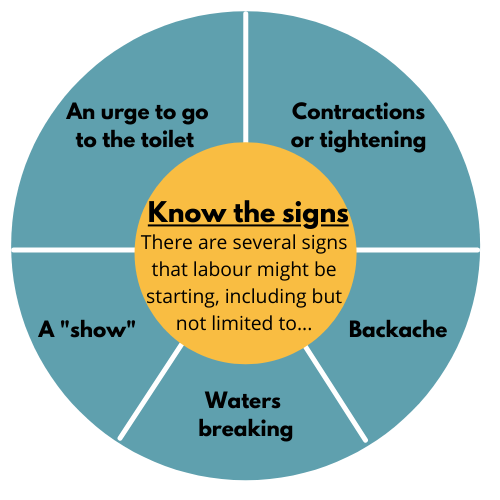Signs of Labour
You can do this!
It is important to remember that your body is unique.

Start of Labour
The start of labour is called the ‘latent phase’. Your cervix gets ready to open for your baby to be born. This can take hours or days.
You will most likely be advised to stay at home during the latent phase. If you got to the hospital or maternity unit, they may suggest that you go back home, but call your midwife if you are unsure or worried about anything.
What do contractions feel like?
When you have a contraction, your womb tightens and then relaxes. For some people, contractions may feel like intense period pains straight away. For other people, the intensity of your contractions may build up over time.
You may have had contractions during your pregnancy, particularly towards the end. These tightenings are called Braxton Hicks contractions and are usually painless.
Your contractions tend to become longer, stronger and more frequent as your labour progresses. During a contraction, the muscles tighten and the discomfort increases. If you put your hand on your abdomen, you'll feel it getting harder; when the muscles relax, the pain fades and you will feel the hardness ease. The contractions are pushing your baby down and opening the entrance to your womb (the cervix), ready for your baby to go through.
Advice from Mum's on how to deal with the pain you may be experiencing:
- Moving around / changing position
- Deep breathing
- A heat pack / hot water bottle on your back
- A warm shower or bath to help you relax
- Listening to your favourite music
- Keeping your bladder empty (go to the toilet regularly!)
- Eat and drink as normal for as long as you can
- Take each contraction as it comes. They might not all feel the same and your body will respond differently to each one.
Your midwife will probably advise you to stay at home until your contractions become frequent and strong.
Call your midwife or maternity unit for guidance when your contractions:
- last at least 60 seconds
- come every 5 minutes or
- you think you are in labour
Backache often comes on in labour
You may get back ache or a heavy, aching feeling. Try to find a position that is most comfortable to you. A hot water bottle can also help relax this area.
A "show" can signal the start of labour
A show can indicate that the cervix is starting to open. Labour may quickly follow or may take a few days. Sometimes there is no show.
During pregnancy, there's a plug of mucus in your cervix. This mucus comes away just before labour starts, or when in early labour, and it may pass out of your vagina. This sticky, jelly-like pink mucus is called a show.
It may come away in 1 blob or in several pieces. It's pink because it contains a small amount of blood.
If you're losing more blood, it may be a sign something is wrong, so phone your hospital or midwife straight away.
What happens when my waters break
It's likely your waters will break during labour, but it can also happen before labour starts.
Your baby develops and grows inside a bag of fluid called the amniotic sac. When it's time for your baby to be born, the sac usually breaks and the amniotic fluid drains out through your vagina. This is your waters breaking. Contractions can feel more intense after this happens.
If your waters break naturally, you may feel a slow trickle or a sudden gush of water you cannot control. To prepare for this, you could keep a sanitary towel (but not a tampon) handy if you're going out, and put a protective sheet on your bed.
Amniotic fluid is clear and pale. Sometimes it's difficult to tell amniotic fluid from urine. When your waters break, the water may be a little bloodstained to begin with.
Sometimes when you're in labour, a midwife or doctor may discuss with you whether to break your waters (if they haven't already broken naturally).
To read more about whether your waters have broken click here.
Call your midwife or maternity unit if:
Your waters break
You have vaginal bleeding
Your baby is moving less than usual
You’re less than 37 weeks pregnant and think you might be in labour
These signs mean you need to see a midwife or doctor.
Tell your midwife immediately if:
-
the waters are smelly or coloured
-
you're losing blood
This could mean you and your baby need urgent attention.
If your waters break before labour starts, call your midwife. Use a sanitary pad (not a tampon) so your midwife can check the colour of the waters.
Contact number of each unit:
DONCASTER AND BASSETLAW:
01302 642711
JESSOPS (Sheffield) 0114 226 8091
BARNSLEY 01226 432249
ROTHERHAM 01709 427700



